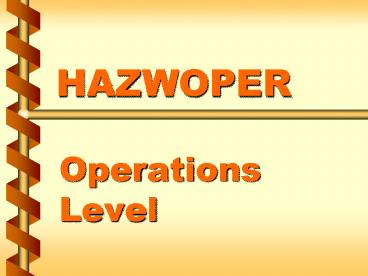HAZWOPER - PowerPoint PPT Presentation
1 / 25
Title:
HAZWOPER
Description:
HAZWOPER Operations Level Responsibilities First responders at the operations level must be able to respond to releases of hazardous substances Responsibilities They ... – PowerPoint PPT presentation
Number of Views:709
Avg rating:3.0/5.0
Title: HAZWOPER
1
HAZWOPER
- Operations Level
2
Responsibilities
- First responders at the operations level must be
able to respond to releases of hazardous
substances
1a
3
Responsibilities
- They respond in a defensive fashion without
actually trying to stop the release
1b
4
Responsibilities
- First responders must be able to demonstrate a
competency in - Performing the applicable skills of 29 CFR
1910.120(q) - Understanding the information provided in 29 CFR
1910.1201
1c
5
Responsibilities
- First responders must be able to demonstrate a
competency in - Hands-on experience with relevant sources of
information that addresses hazardous
substance releases
1d
6
Responsibilities
- First responders must be able to demonstrate a
competency in - Analyzing an incident to determine the presence
of hazardous substances
1e
7
Responsibilities
- First responders must be able to demonstrate a
competency in - Determining the physical and chemical
properties of a substance and its container
1f
8
Responsibilities
- First responders must be able to demonstrate a
competency in - Determining the types of hazardous substance
transportation containers involved in a release
1g
9
Responsibilities
- First responders must be able to demonstrate a
competency in - Implementing continuing response actions
consistent with the local emergency response
plan
1h
10
Responsibilities
- First responders must be able to demonstrate a
competency in - Selecting the proper PPE
1i
11
Responsibilities
- First responders must be able to demonstrate a
competency in - Personnel and equipment decontamination
- Understanding the potential hazards of a
hazardous release site
1j
12
Responsibilities
- First responders must be able to demonstrate a
competency in - The information provided in NFPAs standard
number 472
1k
13
Training
- First responders at the operations level must
have achieved first responder awareness competency
2a
14
Must have at least 8 hours of training, or
- Knowledge of the basic hazard and risk assessment
techniques - Knowledge of selecting PPE
- An understanding of basic hazardous materials
terms
2b
15
Must have at least 8 hours of training, or
- Ability to perform basic control, containment,
and confinement operations - Knowledge of how to implement basic
decontamination procedures
2c
16
Must have at least 8 hours of training, or
- An understanding of the relevant standard
operating procedures and termination procedures
2d
17
Types of hazards a first responder may encounter
- Chemical exposure
- Fire and explosion
- Oxygen deficiency
- Ionizing radiation
3a
18
Types of hazards a first responder may encounter
- Biological hazards
- Safety hazards
- Electrical hazards
- Heat stress
3b
19
Types of hazards a first responder may encounter
- Cold exposure
- Noise
- Confined space entry hazards
3c
20
Routes for chemical exposure
- The majority of toxic substances enter the body
through breathing - Other means include absorption, ingestion, and
injection
4a
21
Routes for chemical exposure
- Chemical exposures are divided into two groups
- Acute
- Chronic
4b
22
Routes for chemical exposure
- Symptoms from acute exposures occur during or
shortly after exposure to a high concentration - Symptoms from chronic exposures occur over longer
periods of time after exposures to low
concentrations
4c
23
Personal protective equipment
- PPE shields and isolates individuals from
chemical, physical, and biological hazards
5a
24
Personal protective equipment
- Types of PPE include
- respiratory equipment
- protective clothing
- boots
- gloves
5b
25
Personal protective equipment
- No single combination of PPE is capable of
protecting against all hazards
5c































